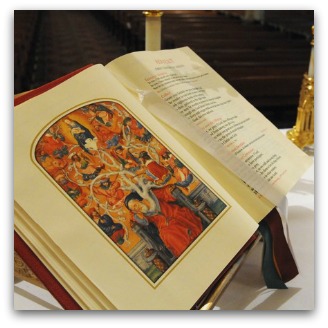Keywords: Language
There are more than 200 results, only the first 200 are displayed here.
-

RELIGION
- Andrew Hamilton
- 14 November 2013
14 Comments
In a welcome first step, the Vatican has invited lay Catholics to offer their views on the family. The document that accompanies the survey represents a fairly traditional Catholic theology of the family, setting it within a high theology and expressed in elevated language. This theology has been developed principally by celibate men, no doubt familiar with family life through their childhood and pastoral ministry, but at a distance from it.
READ MORE 
-

ARTS AND CULTURE
- Thomas Shapcott
- 05 November 2013
8 Comments
There is nothing more obvious than the smell of living. It is like movement, and, like movement, it is everywhere. The smell of dying is also everywhere. Why do we hide it with cosmetics? We are appalled. Why are we appalled?
READ MORE 
-

ARTS AND CULTURE
- Ellena Savage
- 27 September 2013
6 Comments
The pleasure of not affecting one's native mode of speech to appease a kind of person who means to privilege the privileged, is unparalleled. Try speaking in a playful way to someone who's scared of bimbos, and then watch their brains literally explode. When a listener struggles to understand that when I say I 'literally died', and yet clearly am still alive, that I am using language in a playful and even ironic way, it's not really their fault.
READ MORE 
-

AUSTRALIA
- Andrew Hamilton
- 22 August 2013
16 Comments
Reflecting on his participation in an SBS TV marriage equality discussion, Ben felt judged and humiliated by many who responded to him. Must determining what is right and wrong for a society be bound up with judging people? Or can we listen to our conversation partners, reach for a language that is shared and leave room for our opinions to be changed? Pope Francis showed the way when he said: ‘If a person is gay and seeks the Lord and has good will, well who am I to judge them?’
READ MORE 
-

RELIGION
- Frank Brennan
- 19 August 2013
28 Comments
During part of the conversation that was recorded by SBS but not aired, I told Penny Wong I thought her homosexuality was as natural, complex and mystical as my heterosexuality. It is time we dropped the unhelpful, judgmental language of intrinsic and objective disorder when respectfully trying to determine appropriate laws and policies for all people who want to support and nurture each other and their children.
READ MORE
-

ARTS AND CULTURE
- Selected poems
- 06 August 2013
1 Comment
The factory thrust its bloody quota past her six days a week, and she did what she had to. The gloves and boots and heavy denim became first and last lines of defence. She lost a thumb once, then a fingertip a year later. Language didn't come into it. She got sick and sacked in the same fortnight, then lay doggo for a decade.
READ MORE 
-

AUSTRALIA
Ted didn't need a translator. He spoke Kriol fluently having spent many years working with Aboriginal people across the Territory. The locals smiled and visibly opened to him, clearly honoured by his effort to meet with them in their country on the basis of equality and respect. Learning the vernacular, and learning through the vernacular, establishes in students a sense of pride and power.
READ MORE 
-

AUSTRALIA
- Ellena Savage
- 07 June 2013
10 Comments
This past fortnight, race has been high on the agenda. Can a 13-year-old be racist? Is what Eddie McGuire said racist? Meanwhile, revelations that police officers in one Melbourne suburb had printed and distributed 50 racist stubby holders hinted at a frightening culture of racialised violence. The reality is that racial violence is inextricable from racist language.
READ MORE 
-

ARTS AND CULTURE
- Gillian Bouras
- 17 April 2013
8 Comments
The label 'crazy script' really infuriated me. The article suggested the Irish were all the better for having parted with their own 'crazy' Gaelic script in the 20th century. But an attack on a culture's language is an efficacious way of destroying the culture itself, and scrapping an alphabet seemed to me to be the thin edge of the wedge.
READ MORE 
-

RELIGION
- Andrew Hamilton
- 17 January 2013
109 Comments
One year on from the introduction of the New Mass Translation it is clear that the more dramatic hopes and fears were not realised. There were no reports of widespread rebellion in the pews, but nor has there been the great spiritual renewal that some promised. The language of the new translation is simply not grounded.
READ MORE 
-

AUSTRALIA
- John Falzon
- 21 December 2012
17 Comments
The greatest power for progressive social change lies with the forming of connections between the excluded. This Christmas I invite you to join me in saluting the people who experience exclusion and who are best placed to teach all of us how best to change society for the better.
READ MORE 
-

RELIGION
- Frank Brennan
- 23 November 2012
1 Comment
'Might not the chief problem with Church language in the public square be that we tend to come from a position of moral superiority, approaching those dreadfully compromised politicians who will do anything to be elected? The abuse crisis reminds us that the Church is not irreproachable.' Text from Fr Frank Brennan's presentation at the Anglican Church of Australia's Public Affairs Commission Conference, November 2012.
READ MORE